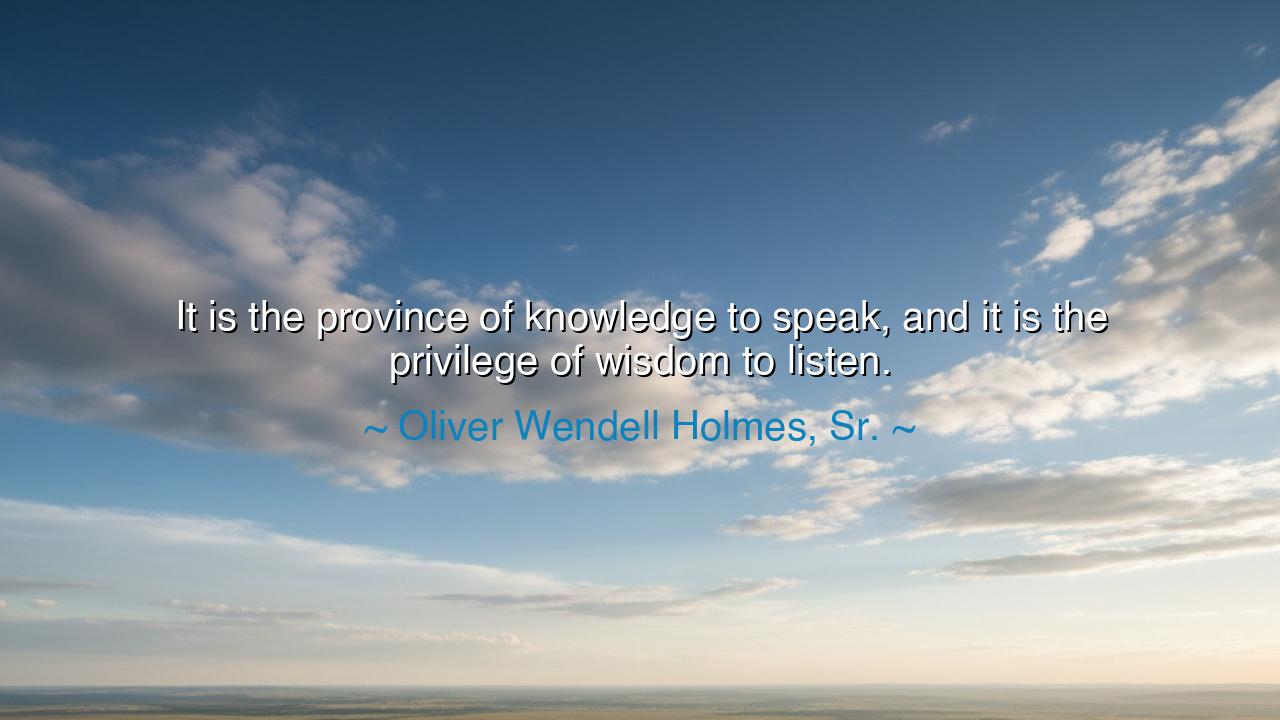
It is the province of knowledge to speak, and it is the privilege






“It is the province of knowledge to speak, and it is the privilege of wisdom to listen.” Thus spoke Oliver Wendell Holmes, Sr., the physician, poet, and philosopher whose words still echo with quiet power across the centuries. In this saying, he reveals one of the greatest paradoxes of human understanding: that while knowledge compels us to express, to teach, to declare what we have learned, wisdom reminds us to pause, to listen, and to receive. The one is active, the other receptive; the one fills the air, the other fills the heart. And in the dance between them lies the secret rhythm of enlightenment — for speech without listening is noise, and listening without thought is emptiness.
Holmes, who lived in the fervent age of American learning and reform, understood the great pride that often accompanies knowledge. In his time, science and philosophy were awakening from old darknesses, and men of intellect were eager to speak their discoveries to the world. Yet Holmes, a man of both science and soul, saw a deeper truth: that the act of speaking, though noble, must be tempered by the grace of listening. To speak is to share what is known; to listen is to open oneself to what is yet unknown. Thus, knowledge gives us the voice, but wisdom gives us the ear. And only through both can true understanding be born.
In the ancient world, this truth was already known. The philosopher Socrates, whose wisdom shaped the foundations of Western thought, was famed not for speeches, but for questions. He called himself “ignorant,” not because he lacked knowledge, but because he recognized its limits. When others claimed to know, he listened — not with arrogance, but with curiosity. Through his questions, he drew truth out of others, as a sculptor draws form from marble. So it was that Athens learned to speak with reason, and yet, more importantly, to think with humility. In this way, Holmes’s words echo the wisdom of the ancients: that listening is not weakness, but the highest form of strength.
Consider, too, the story of Abraham Lincoln, whose greatness lay not merely in his eloquence, but in his capacity to listen. During the long and bitter years of the American Civil War, Lincoln’s cabinet was filled with men who argued, criticized, and opposed him. Yet he listened — patiently, attentively, without haste or anger. In silence, he gathered their words like seeds, separating the sound from the substance. Only when he had truly understood all sides did he speak, and his words carried the weight of reflection, not reaction. That is the privilege of wisdom — to speak only when the heart and mind have first listened to truth.
Holmes reminds us that knowledge and wisdom are not the same, though they are often mistaken for each other. Knowledge is learned; wisdom is earned. Knowledge tells us what can be done; wisdom asks whether it should be done. Knowledge fills books and halls; wisdom fills silence and souls. The man of knowledge may speak with brilliance, but the man of wisdom speaks with resonance, because he has first listened — to others, to the world, and to his own conscience. The one builds arguments, but the other builds harmony. Thus, Holmes calls us not only to learn, but to listen — to cultivate humility amid our understanding.
Yet, my children, to listen is not merely to be silent; it is to be present. It is to hear with the heart as well as with the ear, to perceive the meaning behind the words, the truth beneath the surface. The wise do not listen to reply — they listen to understand. The fool interrupts; the sage absorbs. In every conversation, the wise man learns more than he teaches, for every voice carries a piece of truth. Listening, then, becomes a sacred act — the bridge between minds, the mirror of empathy, the soil in which knowledge blossoms into wisdom.
So, take this lesson to heart. Let knowledge teach you to speak clearly, but let wisdom teach you when to be still. When others speak, listen not to their words alone, but to the spirit beneath them. Listen to those who disagree, for they may reveal what pride conceals. Listen to the humble, for their simplicity hides great depth. Listen even to silence, for in it speaks the voice of understanding. Remember always: the tongue teaches others, but the ear teaches the self.
Thus, as Oliver Wendell Holmes, Sr. teaches, speech is the province of knowledge, but listening is the privilege of wisdom. To speak is to give; to listen is to grow. And only in the union of the two does man fulfill the purpose of the mind — not to dominate with words, but to harmonize through understanding. So walk through the world as both speaker and listener — a student to every voice, a teacher through every word — and you will find that wisdom, once heard, is the greatest sound of all.






AAdministratorAdministrator
Welcome, honored guests. Please leave a comment, we will respond soon